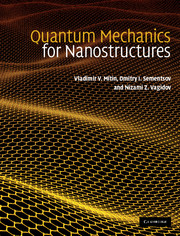Book contents
- Frontmatter
- Contents
- Preface
- List of notation
- 1 The nanoworld and quantum physics
- 2 Wave–particle duality and its manifestation in radiation and particle behavior
- 3 Layered nanostructures as the simplest systems to study electron behavior in a one-dimensional potential
- 4 Additional examples of quantized motion
- 5 Approximate methods of finding quantum states
- 6 Quantum states in atoms and molecules
- 7 Quantization in nanostructures
- 8 Nanostructures and their applications
- Appendix A Classical dynamics of particles and waves
- Appendix B Electromagnetic fields and waves
- Appendix C Crystals as atomic lattices
- Appendix D Tables of units
- Index
1 - The nanoworld and quantum physics
Published online by Cambridge University Press: 05 June 2012
- Frontmatter
- Contents
- Preface
- List of notation
- 1 The nanoworld and quantum physics
- 2 Wave–particle duality and its manifestation in radiation and particle behavior
- 3 Layered nanostructures as the simplest systems to study electron behavior in a one-dimensional potential
- 4 Additional examples of quantized motion
- 5 Approximate methods of finding quantum states
- 6 Quantum states in atoms and molecules
- 7 Quantization in nanostructures
- 8 Nanostructures and their applications
- Appendix A Classical dynamics of particles and waves
- Appendix B Electromagnetic fields and waves
- Appendix C Crystals as atomic lattices
- Appendix D Tables of units
- Index
Summary
A review of milestones in nanoscience and nanotechnology
It is extremely difficult to write the history of nanotechnology for two reasons. First, because of the vagueness of the term “nanotechnology.” For example, nanotechnology is very often not a technology in the strictest sense of the term. Second, people have always experimented with nanotechnology even without knowing about it. Ironically enough, we can say that the medieval alchemists were the founding fathers of nanoscience and nanotechnology. They were the first researchers who tried to obtain gold from other metals. The ancient Greek philosopher Democritus also can be considered as a father of modern nanotechnology, since he was the first to use the name “atom” to characterize the smallest particle of matter. The red and ruby-red opalescent glasses of ancient Egypt and Rome, and the stained glasses of medieval Europe, can be considered as the first materials obtained using nanotechnology. An exhibition at the British Museum includes the Lycurgus cup made by the ancient Romans. The glass walls of the cup contain nanoparticles of gold and silver, which change the color of the glass from dark red to light gold when the cup is exposed to light. In 1661 the Irish chemist Robert Boyle for the first time stated that everything in the world consists of “corpuscules” – the tiniest particles, which in different combinations form all the varied materials and objects that exist.
Information
- Type
- Chapter
- Information
- Quantum Mechanics for Nanostructures , pp. 1 - 18Publisher: Cambridge University PressPrint publication year: 2010
